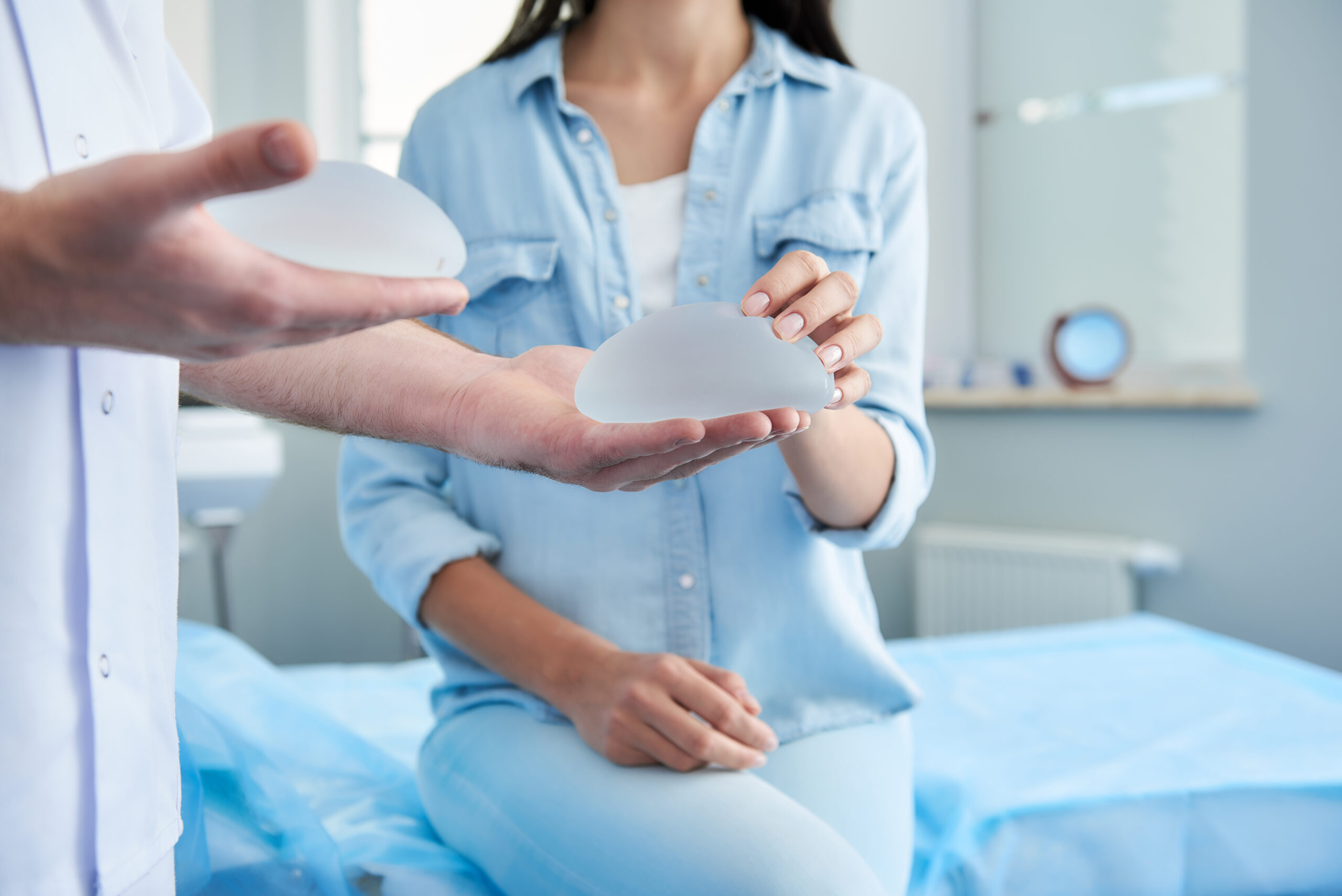
Are your breast implants making you sick? Short answer: probably not. As a plastic surgeon, I’ve met patients who are interested in explant surgery after reading about breast implant-associated illness online or via social media groups. I want my breast augmentation and explant patients to feel empowered to make evidence-based decisions about their health and body. So, is breast implant illness real? Let’s review the latest available data.
What is Breast Implant Illness?
Breast implant illness refers to a range of symptoms reported by some individuals after undergoing breast implant surgery. These diverse symptoms can include fatigue, joint pain, hair loss, headaches, and autoimmune-like symptoms. It’s important to note that breast implant illness is not officially recognized as a medical diagnosis in the traditional sense. Rather, it’s a term used by patients and some healthcare providers to describe these experiences.
Reports of symptoms associated with breast implants date back to the 1990s, shortly after silicone implants became widely used. However, the increasing number of patient testimonials shared on social media and support groups in recent years has brought breast implant illness to the forefront of public and medical discourse. Currently, around 30,000 cases have been reported – a relatively small portion of the 300,000 breast augmentations performed annually in the U.S.
Reported Symptoms of Breast Implant-Associated Illness
Symptoms tend to vary widely among patients, making breast implant illness a particularly challenging topic to study and understand from a medical standpoint.
- Chronic Fatigue: Patients may report feeling persistently tired, regardless of rest. This isn’t just your ordinary tiredness after a long day; it’s a profound, unshakeable exhaustion that significantly impacts daily functioning.
- Muscle and Joint Pain: Unexplained aches and pains in the muscles and joints are frequently mentioned. These are not typically linked to any specific injury and can be debilitating.
- Cognitive Impairment: Often referred to as “brain fog,” this symptom encompasses difficulties with memory, concentration, and overall cognitive function, making routine tasks more challenging.
- Hair Loss: An unexpected and distressing symptom for many, hair loss without a clear cause further contributes to the concern and stress associated with breast implant illness.
- Autoimmune Symptoms: Symptoms that mimic autoimmune disorders, such as skin rashes, dry eyes, and mouth, as well as more serious autoimmune responses, have been reported.
- Digestive Issues: Those concerned about breast implant illness have also described problems with digestion, including bloating, nausea, and changes in bowel habits.
- Breathing Problems: Some individuals experience difficulty breathing, chest pain, or a feeling of tightness in the chest, raising concerns about the impact of implants on respiratory health.
It’s important to note that fatigue, joint pain, cognitive difficulties, and the other symptoms listed can arise from various causes, including autoimmune diseases, hormonal imbalances, chronic fatigue syndrome, and mental health issues, among others. This overlap makes it particularly challenging to directly link these symptoms to breast implants as the sole cause.
Do Breast Implants Cause Cancer? Let’s Examine the Data
Rest assured, there isn’t evidence linking the modern breast implants we use to cancer. But that wasn’t always the case. Breast implant-associated anaplastic large cell lymphoma (BIA-ALCL) is a rare and distinct type of non-Hodgkin’s lymphoma that has been reported in patients with a specific type of breast implant that is no longer on the market. This form of cancer involves T-cell lymphocytes, a type of white blood cell. As of 2023, the American Society of Plastic Surgeons had recognized 411 cases of this form of cancer reported in the U.S.
This condition usually presents as an accumulation of fluid, called a seroma, between the breast implant and the surrounding capsule or, less commonly, as a mass or swelling near the implant. Symptoms can include pain, lumps, swelling, or asymmetry in the breasts long after the surgical incision has healed, typically occurring years after the implant surgery.
The exact cause of BIA-ALCL has yet to be fully understood. Still, research suggests that it may be related to the body’s inflammatory response to implants, particularly textured-surface BIOCELL implants, which haven’t been on the market since 2019. At Plastic Surgeons of Northern Arizona, we have never used this type of implant for any of our reconstructive or cosmetic patients.
Last year, the Food and Drug Administration issued an updated safety communication regarding the potential risk of developing breast implant-associated squamous cell carcinoma (BIA-SCC) within the breast implant capsule. This is an uncommon, aggressive cancer originating from the epithelial cells of the breast implant capsule, characterized by nests and bundles of squamous cells. Despite not affecting breast tissue directly, it appears to potentially invade nearby lymph nodes, tissues, and distant areas like muscle and bone. Just 19 cases of BIA-SCC have been reported as of March 2023. It has been associated with both textured and smooth, saline and silicone implants.
We always discuss potential risks with our patients before breast augmentation or reconstruction procedures involving implants. At Plastic Surgeons of Northern Arizona, we’re focused on keeping patients safe, improving how we care for them, and using the best available science to guide our work.
Sensitivity to Foreign Bodies and Biomaterial Implants
Newer data suggests that breast implant illness may not be exclusive to breast implants but could also relate to other biomaterial implants used in other medical procedures. Similar systemic symptoms and autoimmune responses have been observed with orthopedic implants, suggesting that such immune reactions may be more about the body’s response to the implant’s microenvironment than the material itself.
Various implanted materials, including silicone breast implants, polypropylene mesh, and prosthetic components used in joint replacements, can trigger a systemic condition mirroring a condition called autoimmune/autoinflammatory syndrome induced by adjuvants (ASIA) syndrome. This reaction is largely due to a foreign body response and the materials acting as adjuvants, sending ‘danger signals’ that amplify the body’s immune responses. The interaction between adjuvants and the immune system involves several key mechanisms, such as enhancing antigen presentation, promoting antigen translocation to lymph nodes, converting antigens into forms more easily processed by immune cells, and triggering the release of inflammatory cytokines. Evidence suggests that these immune responses create a memory effect involving T cells and B cells that help orchestrate further immune activity through cellular interactions, inflating inflammation and tissue remodeling. The resulting inflammatory response from implantation may lead to chronic immune activation, characterized by cytokine production, oxidative stress, and the attraction and activation of neutrophils. This would seem to explain the wide range of multi-system symptoms reported by patients purported to have breast implant illness.
Studies in animal models have shown that various medical implants can exacerbate or increase susceptibility to autoimmune conditions – but only in subjects that are predisposed to autoimmunity. In humans, we need more research conducted. Still, if a patient has an extensive history of allergies and a personal or family history of autoimmune conditions, then breast implants may not be the best option.
So, Is Breast Implant Illness Real?
Based on the available evidence, it’s important to note that there is no conclusive scientific proof directly linking breast implants to these system-wide conditions. While personal experiences and symptoms are undoubtedly real and can significantly impact one’s quality of life, the current body of scientific research suggests that it’s more likely the implants themselves do not cause harm to the body.
However, it does appear that breast implants may trigger an abnormal immune response in a small group of patients who are already predisposed to autoimmunity. Current literature suggests that rather than using the nonspecific term “breast implant illness” to define these symptoms, we should diagnose it as an autoimmune/autoinflammatory syndrome induced by adjuvants due to silicone incompatibility syndrome.
I don’t want to diminish the experiences or concerns of anyone suffering from unexplained health issues. Rather, I hope this article will call into focus the importance of breast implant medical research so that we can come up with better treatment plans for patients experiencing these debilitating symptoms.
As a plastic surgeon, I am committed to your overall well-being. This includes thoroughly considering all potential health concerns and taking a holistic approach to your care.
Book A Consultation Today
Our award-winning, board-certified plastic surgeons specialize in breast augmentation, breast reconstruction, and explant procedures. Book a consultation today at our Flagstaff, Sedona, Cottonwood, Prescott Valley, or Kingman offices.
Author Profile: Brian Cripe, M.D., is an award-winning, board-eligible plastic and reconstructive surgeon proudly working with the Plastic Surgeons of Northern Arizona practice. Dr. Cripe specializes in cosmetic surgery, limb salvage, peripheral nerve microsurgery, hand surgery, and oncologic reconstructive procedures. He has performed over 5,000 surgical cases during his nine-year tenure as a surgeon.




